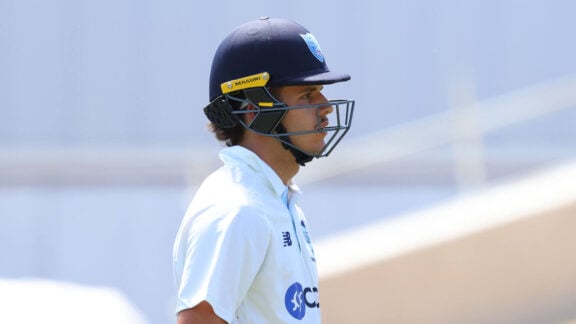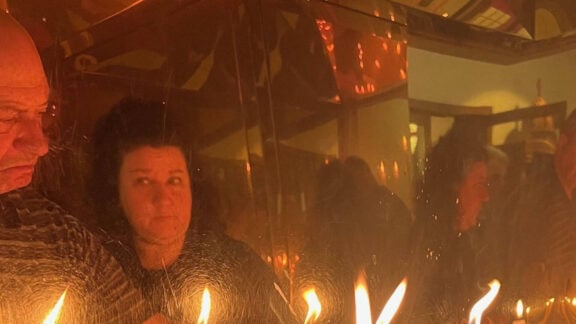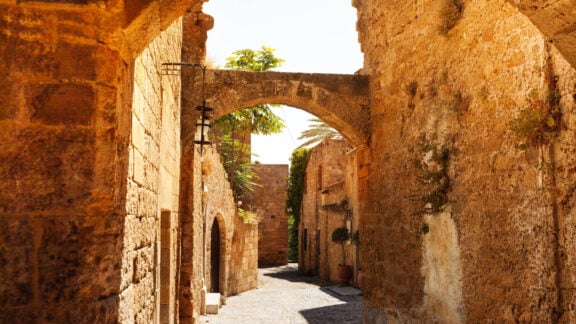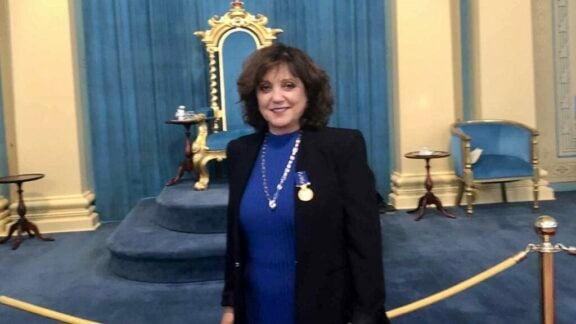Venezuela’s shores are caused by warm Caribbean sea. You would think my highlight would be sitting at a pristine beach taking in street food as baseballs whizz passed. No, it was the Greek Church, a big-hearted Greek priest and the Greek community of Caracas.
The Greek complex is home to the church, school, library, a parklet for children, taverna, and a mini football field. I told Padre Evangelos that I would love to show Venezuelans my football skills. Realising I had no sneakers and no players, I was simply lying – and he knew. Padre, God on his side, sent a message via WhatsApp that a Greek-Australian was here and challenging everyone to football.
Within hours, it was ont. Teenagers and young people – fit, thin and fast – showed up. Some of the players being locals including Greek, while others from parts of Sudamérica. I didn’t have sneakers, Padre who is also a goalkeeper provided me with his, which allowed me to score two goals against him.
I may have endured numerous heart attacks and humiliation on the ground- that night, yet it remains a favourite – across my travels.

Comunidad Ortodoxa Griega de Venezuela was established in 1960 in its current location. The hard work of Greeks who left their homeland in times of poverty came to Venezuela during boom times, sweating and rolling up their sleeves as street vendors, markets and small businesses, they built a number of Greek pockets including this gem in Caracas and places such as Valencia.
Juan the Greek arrived in 1922 to settle on an island, naturally, and Mr Kalimios who established a ferry company, naturally, in the eastern area of Maracaibo, early 1920s.
From 1948, hundreds of Greeks were migrating to Venezuela, uniquely, not all were born in Greece as I suspect Juan el Griego was likely born in Smyrna. Many of these Greek speakers were born in Romania, Germany or other places in the Americas.
As Venezuelan oil and prosperity grew, many more Hellenes arrived before the end of the century.
A Greek School was established in 1967, with at least five Greek newspapers operating during the 1960s-1970s, an indication of the strength of the Greek community.

The Greek Orthodox Archdiocese of America assisted the community with the creation of a small Greek chapel between 1956 to 1961; in February 1992, a new Byzantine style church was consecrated, the church where I met Father which is called Dormition of the Holy Mother of God.
Churches were built across the vast Venezuela, including Maracaibo, Barquisimeto, Valencia, Valles del Tuy conurbation.
The passionate and charismatic Padre/Father Evangelos speaks Greek fluently, his Father and mentor is Padre David in their native Colombia, in Medellin. They felt a connection to Greek Orthodoxy since at least the 1980s. “In the beginning we were all pseudo-Orthodox, after 10 years of dilation, in 1996 or 1997 we met Archbishop Athenagoras, from the Metropolitan of Mexico.” The meeting with the revered Archbishop changed their lives, with three Greek Orthodox priests being recognised in Colombia around this time.

Father Evangelos went to Greece in January 2005, living there for 18 months including eight months in Chania. He tells me of the time he went to Mexico City in 2010 for Holy Week before being sent to Valencia until the end of the decade, before arriving in Caracas as the resident priest. Father makes the point that there are always Greeks around. It’s estimated there are 3500- 4000 Greeks in Venezuela. He tells me that the community is going well as they prepare to send 47 young people to a Greek cultural event in Valenica, the second of its kind, joined by young people and their parents from at least ten cities or towns. “Kids are the future of our community, without them our culture will disappear,” he explains.
One of the most beautiful and soulful experiences I had on my trips to the Americas was listening to the hymns and singing in church. One voice stood out, the Papadia, Kuria Aymara/Maria, who is married to Father. The voice and the liturgy made for a beautiful Sunday morning, I am sure Odysseas would have appreciated what he heard. The service was attended by 70 members.

The president, Theodoros Maragellis, is rightly proud of the community he leads. He made me feel as welcome as possible and along with Giorgo Bacopulos, and a few other representatives, I was given a tour of the impressive complex. Two levels of Hellenism adjacent to the church. The impressive reception/venue which is perfect for large events covers the ground floor; upstairs there are classrooms for teaching Greek – led by the teacher Alcibiades from Greece, offices for the community, and a library.
Giorgo is a 40-year-old successful business owner who attained his business degree in Athens, having spent eight years in Greece. He is a shining example of Greeks in Venezuela as he is tri-lingual and devotes a lot of his spare time to the community. Giorgos, is the VicePresident, tells me “the community is always happy to welcome travellers like me.” He has a sister now lives in my home city, Sydney.
Alexandros Kakalanos is a photographer, Greek dancer and a font of knowledge for local history. Upon meeting him, two things I would not have expected, he is 55 years old and he is a Dentist. Aside from looking half his age, his personality lends itself more to photography. Alexandros proudly tells me his parents are from Lemnos, possibly the second-best island in Greece, after Lesvos.

The compound of course has its own Greek taverna or simply known as Taberna as Giorgo pointed out, where everyone moves to after the uplifting church service. Alcibiades held the fort for a while talking about recent Greek language achievements before Padre and the President reclaimed the audience.
What struck me about the people in attendance, was the fact three generations were represented. Each table I sat with had a story, a living oral history to tell which no 1200-word article can do justice.
Some of the people I met, all giving me their phone numbers and offers for lunch/dinner, include Kurio Nikos, Kurio Alkis Kolias, Kurio Frangis and a few more friendly faces. Their living history is poignant; they took a risk and became successful and secure after a few years of hard work.
In a nod to the future, I spoke to university student of economics, Javier Colina. He helps Father and the Church every Sunday, an accomplished Greek dancer. He explains, “I am a third generation Greek, and the family’s heritage in Venezuela begins with my grandfather, Theodoros Laliotis, who came to Venezuela looking for opportunities after the Greek Civil War era. Being Greek for me is about embracing the tradition and culture, about living the values of those great people who came before us and keep going forward with them. To be Greek, Ellinas, Romaios, starts with these traditions and values we’ve created, developed through millennia. It means to be as driven as Alexander and Pericles, as brave as Leonidas and St. Constantine, and as loving as St. Porphyrios and St. Paisios.”

I was driven back from my football match meets heart attack session by local Greek youth thanks Diego and mates. Good footballers, with good career prospects ahead in a land with a shaky economy and the occasional political turbulence.
Caracas has an amazing and strong Greek community that is well led, with a strong future in Venezuela. On a spiritual level, I can’t speak highly enough of Father Evangelos, his inspiring sermons, instant friendship and genuine warmth made this traveller feel at home. As for the beaches, as beautiful as they were, I spent more time helping locals push start broken down cars than actually swimming!
Watch the Greeks Venezuela mini-documentary below:
*Billy Cotsis is the author of The Aegean Seven Take Back The Stolen Marbles, Amazon








